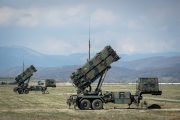
Despite protests from Muslims and Jews living in the Netherlands, the Dutch parliament has passed legislation which requires the humane slaughtering of livestock. If the Dutch Senate also passes the bill, the Netherlands will join Switzerland, Sweden, Norway, New Zealand, and Luxembourg in banning the religiously-motivated practice of slaughtering animals without first stunning them.
According to an article published by Radio Free Europe (RFE), “religious groups would be allowed to get an exception from the ban if they can scientifically prove their slaughter methods are less painful to animals than preliminary stunning”— but the ability of Muslims and Jews to demonstrate that halal and kosher practices are less painful for the animals is in doubt, given that they require, in the words of the RFE story, “an animal to be conscious at the time of death.”
Protests against the new legislation from the Jewish community in the Netherlands have already invoking the specter of World War II-era Nazi policies. As Toby Sterling wrote for the Associated Press:
[The Netherlands] will join Switzerland, the Scandinavian and Baltic countries, whose bans are mostly traceable to pre-World War II anti-Semitism.
In New York, the Anti-Defamation League condemned Tuesday’s vote in the lower house, with its national director, Abraham H. Foxman, calling it “a de facto ban on kosher slaughter” that “has repudiated the Netherlands’ historic commitment to religious freedom.”
“Dutch Jews must not be put to the choice of violating a central tenet of Judaism, foregoing fresh meat, or emigrating. We call upon the Dutch Senate to prevent this action from leading to a clear violation of religious freedom that has a disproportionate impact on the Jewish community,” Foxman said in a statement.
Given the fact that a population of 30,000 Jews makes up less than one fifth of one percent of the population of a country of over 16.5 million people, it seems implausible to view antisemitism as the motivation for adopting the legislation. A far more believable argument can be advanced that the new legislation gained support because of its perceived impact on the Muslim community.
According to a 2008 briefing paper by The Institute for Multicultural Development FORUM in the Netherlands, despite the fact that only 6,000 native-born Dutch are Muslims, adherents of Islam now constitute 5.8% of the population of the Netherlands. According to the same briefing paper,
At present 1.7 million people in the Netherlands originate from or have parents from non-Western countries. Turks, Moroccans, Surinamese and Antilleans/Arubans make up nearly two-thirds of these non-Western ethnic minorities. …
Non-Western ethnic minorities have mainly settled in the four largest Dutch cities: Amsterdam, The Hague, Rotterdam and Utrecht. One out of three inhabitants in Amsterdam, Rotterdam and The Hague is a member of a non-Western ethnic minority. In Amsterdam and Rotterdam respectively 55% and 54% of the youth are members of a non-Western ethnic minority. At the other end of the scale, smaller villages in the countryside hardly have any non-Western ethnic minorities.
The FORUM report notes that current research places the number of Muslims living in the Netherlands at 837,000 in 2006. Given a Muslim population which is at least 28 times larger than the Jewish community, it seems far more likely that any member of the Dutch parliament who was thinking of the potential for restricting the activities of a given religious group within the country was probably far more mindful of Muslim practices. Nevertheless, the Associated Press evoked the horrors of antisemitism while discussing one of the most “politically correct” nations in the western world; in Sterlings’ words, the bans on the ritual slaughter of animals “are mostly traceable to pre-World War II anti-Semitism.” Swedish and Swiss neutrality in the second World War, and the heroic struggle of Norway’s resistance movements against the German occupation count for nothing when building the case for slashing the throats of conscious animals so that Turks and Moroccans can consume the same halal dishes they enjoyed back home.
Still, the inherent reaction of post-War Europeans to the specter of antisemitism is more likely to rally opposition to the legislation than attempting to elicit sympathy for a community which would demand its own religious liberties at the very time when it has sought to curtail the free speech of Dutch politician Geert Wilders and others who have opposed the totalitarian ideology which is at the heart of the Koran.
The vote on the legislation in the Dutch parliament was a very clear majority of 116, with only 30 votes cast in opposition. As noted above, those communities that wish to defend the ritual slaughter of animals will have their opportunity to prove how their practices are humane and painless.
Related article: The Party for Animals Takes on Jewish and Muslim Law
Photo: A package of halal-certified (note green label on the package) frozen food from China.



